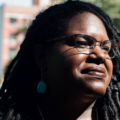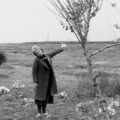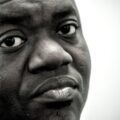The Path

On your left, says a cyclist, the pedestrians shifting to the side like slow schools of fish. Always the grandparents and the parents, the little one in the stroller, the dad’s parents, the dad pushing the stroller, the mom with a coffee chatting easily with the in-laws.
Or the senior citizen out for her evening constitutional. Or the mother running her young son so later he will sleep.
If you are not on a bicycle or running at a clip, a toddler will approach you on his scooter.
“Wuh-wuh-where are going?” he says, this time interrupting two Indian men with handlebar moustaches. They are whipping their wrists and hands around as they speak. Then stop talking to each other to address the toddler. “Where is your license?” they ask the toddler, twisting their moustaches. They tell us there’s a puppy up ahead with unusual markings, and so the toddler speeds away.
My son says he doesn’t like people walking without dogs on the path.
My son says he doesn’t like people walking without dogs off the path.
“Why is that woman following us? Stop following us.” Leave her alone. She’s on the path like us, doing her own thing. Many smiles are exchanged on the path. Even when my child frowns.
Sometimes I think they are smiling because they see a middle-aged white woman and her spirited black child. They’re into it. When someone shoots a dark look, I think it is because I am a middle-aged white woman with a spirited black child.
On the path we always meet someone we know. There is much fanfare, much reunion. What are you doing here on the path? Is something we don’t ask because we are either embarrassed by the obvious. Or don’t want to pry.
Runners run past. A child on a child’s bike with silver streamers that fly back taut and straight through a diagonal windfall of yellow leaves.
To love is to know nothing over and over. Some wizened cowboy type in a Harley tee, the kind of guy who likes to say “Don’t do me any favors” to his lovers, sees my son and hears me yelling from behind, “PUT DOWN THAT STICK.” “All you have to do is keep him safe,” he says as I pass. In other words, what if it’s not a problem? In other words, WHO ARE YOU TO SEPARATE THAT BOY FROM HIS STICK.
Once when the entire path was something to be endured, a stick saved my life. More like a branch.We were on our way home, but only at the beginning of our way home, when my son wanted to be carried, to be warm and inside right now. I told him, hew to the middle of the path. Skip the off-roading, the snow-flopping, the berm-tumbling. You will waste less energy, grow less tired. Even as I said it, I knew I must have a game to get further down the path. Are you game? Do you have game? How does one game the path?
He asks how does a bird get into its house when the hole is so tiny? It folds its feathers tight against its body, like this. It tucks its head into its neck, like this. To fly out, it does this. Flap, flap. Tuck tuck. Flap, tuck, flap, tuck. After so much flapping and tucking, we have covered twenty whole feet of the path.
The branch he found became a lance for jousting. It became the horse on which the jouster jousted. The jouster. A battering ram to charge the castle gates. What’s jousting, what’s a battering ram? Do I have a horse like a bandit? The branch became a jackhammer that ran along a seam of snow lifting it slightly from its fresh, fallen perfection. Then finally it became a gate.
For an eternity, we stand on the side of the path raising and lowering the gate for anyone who passes.
One of the things I like best is reading poetry in bed while my son sleeps beside me. Even though there’s an empty bed twice the size of this one and more comfortable just across the apartment. What I do not like best is making a gate with a branch across the path for more than two minutes. But there is always someone in the distance we must wait for to let pass through the gate. A black spot blooming into a person. The moment a sniper looking through his goggles would shoot if we were at war, which we are, nearly everywhere but on the path.
My son runs out toward the blooming path-goer and wheels his arm passionately. THE GATE IS OPEN. HURRY. To my son, you never have to say, once more with feeling.
Here, a snipe is a kind of bird.
Friends, can I tell you of the time when for a little exercise I made up a game called Territory with the small children at the playground. It was very primitive. You can praise me for my genius once you hear it. This is the way it went: if you come on my territory, I chase you off screaming. If I come on your territory, you chase me off screaming. My turf was the small green hill, and I ran the children off with pleasure. We played for a while and then we dispersed without a word. No one left the game before the others. No one said I don’t want to play anymore. At the same moment, we walked our separate ways. We were like a knot coming loose of itself. One to climb the jungle gym, one to the swings, one to the bench. I have tried to write about that moment in one hundred poems.
By the time I reach the path I am so old it is impossible not to love every face I see on the path. Either because it looks familiar, or it doesn’t at all.
Don’t I know you from school, aren’t you my doctor, didn’t we play softball together when we were kids? Didn’t your trailer at the bottom of the hollow on Graceland smell like cat piss and B.O.? Didn’t I love going there anyway? Wouldn’t I go on to dream of a life in a slightly cleaner trailer? Weren’t you at that Barbie party in Manhattan the night Princess Diana died? Don’t you shop at Market Basket? Didn’t I sit with you in the waiting room, sit with you on a plane? I know you from somewhere. Or is that I just know you from the path?
As for the other faces. Could it be? Could it really be that I have never seen it before? You, who meet the light on its own terms. As you look up from tying a shoelace. You who stop to let my son pet your friendly dog? Woe to you who have shocked me into a life I have never had before. Because that is all it takes for the baseline joy I often feel on the path to erupt: an abscess of glee. I will follow you down the path so you can’t but feel followed. I will ask you where you are from, how long you have been here, would you like a leaf? I might go so far to ask you what my son asked me this morning, “Do you like being born?” I do. I’d like to do it more often. Fall out of my mother. Find my legs and stand. How about you?
If I met an erstwhile friend on the path, one I thought had abandoned me, I wouldn’t ask them why? Why did you drop off the face my earth without giving me a reason? Why did you stop returning my calls? On the path, I would be as warm as the earth to a corpse in summer.
The old man from the home with the awful toupee drawn across his forehead like a dead squirrel. What happened to him? I used to see him all the time on the path.
And our neighbor, walking without her dog. I should make her a lasagna.
When friends come to visit, we take them on the path. We see another group of friends moving in the opposite direction. “There’s another group of friends!” says my son. A bunch of young boys force us to bear terrible music from a wireless speaker. They look and look away. Afraid we will think they are stoned. We think, those boys are stoned.
On the path, it seems wrong to wear headphones. I’ll give the boys that. You must at least try to look each passerby in the eye. You must long to be addressed. Or at least allow it.
“Happy New Year!” my son says to each and every thing running, walking or wheeling their way past. A mini-snowplow chugs along and waves. Many paths are closed for the winter, but not ours. When it is time, during mass, to give thanks, I give thanks for the snowplow. I forgot to say we were on our way to a church at the end of the path, which advertises itself as barely Christian and serves lunch after the service.
When I was unsure whether or not to baptize my son because I wanted him to be Buddhist, my friend said, “He can be Buddhist too. It’s like asking for another glass of water. “
On the way to church, long, shallow ponds alongside the path, iced over for skating. My son’s church outfit? Swim trunks over sweats. Sweats tucked into snow boots. On the way to church I say, “Don’t dawdle,” and he asks what “dawdle” means. I say it is all the stuff you do between doing one thing and another.
On the path I sow confusion, contradiction. On the path contradiction elevates to paradox and paradox is promoted to mystery. From whence it bosses us around. But seriously, let’s stick to the plan. On the way back from church, we can get unstuck.
One thing we never see on the path is a family floating by on stilts above us. At night we dream of being this family and what we would wear on our stilts. I would wear a long pale yellow chiffon dress that only barely grazed the ground when it swayed. Then I would top it with a flat, black fedora. My son would wear an extremely tall Stetson so that he would appear slightly taller. He would wear tails and a cravat that we would learn how to tie on You Tube. We would tip our hats and blow kisses to everyone below us. And then, so talented that we could walk on stilts with our eyes closed, we would close our eyes and turn up our noses.
Mom, do bandits wear tall hats? Yes they have very tall hats and sometimes these hats get caught in the low-hanging branches of trees and they fall off their horses. It’s quite surprising to both the bandits and the horses, but the horses love when that happens. They keep going. Light and riderless. “And what does the bandit do when the horse runs away without him?” he asks. “He laughs,” I say. “The End.”
On the way back from church, my son says the path belongs to him. No one else is allowed on it. He makes of his small body a gate the people must negotiate. I tell him this is really not in the spirit of the path.
Everything one says on the path sounds true. Something about the pacing no matter the speed one is going or how. On foot, by scooter or bike, mini-snowplow or street cleaner.
Alongside the path, in the dark, between the trees, cross-country skiers glide silently through the powder.
My son says, “With a balloon, you go under an arch.” He says, “When people are sick, they lay down in barns.” I say, when I first started reading poetry I was often befuddled by the meaning. The music, never. We are late for dinner.
My son breaks the ice with a light stomp and the water pours over his boot. He falls on his swim trunks and stomps again. “The road less travelled,” says someone passing. My son stomps through more ice watching thinner ice sink under a wild gush. “A pioneer,” says the guy’s girlfriend. Then my son grins, his eyes get big as he sinks through the ice into a puddle about one foot deep. His boots completely submerged.
I pull him onto the path and take off his boots, strip off his soaked socks, and sweep him up, asking him to wrap his legs around me and put his cold feet under my coat. I am going to carry you all the way home. Pull up on my neck, and wrap your legs around so your feet touch other.
Then the sodden paper bag I am holding breaks and his wet boots, his soggy socks, his wet blanky, and his wet stuffed badger fall on the path.
Probably not that same day, my child says noises are alive because they pass away.
Lately he has been dividing everything alive from everything not alive. We must be extra kind to what is alive, I say. But we must also be kind to everything that is not alive, like your toys and the vertical blinds, because we eventually hurt that which is alive by hurting that which is not alive.
I tell him not to play with the sliding glass door, which doesn’t belong to us because we are renting. Besides, it wastes heat and that hurts the planet earth. Besides, we are not rich. At this point, I know I am indulging in what parenting manuals describe as too much narrative.
Sometimes I just want the path to end. Then I meet another mother standing in front of the map. We stand for minutes then decide we still have no idea where we are. It has nothing to do with us. It has to do with the imprecision of the map. Thank you thank you for letting my son fire his music gun at your head. Thank you for letting him jump in the candy puddle beside you. Above all thank you for killing time with me right here on this path. I really needed that.
A man passing in the other direction yells “Screw yourselves!” with a virulence I diagnose as hatred, not insanity. I go numb. I check my son who hasn’t heard a thing. Still, the words sting for a long stretch down the path. The pain abates when our sticks become magic wands. We turn the bushes into dragons. We turn trees into dads. But when the game is over, the sting returns, though fainter. By the time I get home, it only stings enough to remember. I tell my mother, and she says, “That happened because your child is black.”
We meet my son’s summer playground friend and his angelic mom on the path. They shriek made up words at each other and bonk each other’s scooters incrementally harder. I trot behind when my son goes long and fast ahead. When he stops and turns around. It’s dark. He’s lost sight of his friend. I tell him they probably went home for dinner. I say, we will probably see him soon on the path. I tell him we will come every night to the path, even Saturday and Sunday, so we don’t miss his friend.
We hear their voices in the darkness talking about the moon. Is it them? It is them. Out of the darkness, under the lamplight, the whole family appears, his friend in a stroller between his dad and the mom, who is super pregnant—how could I have missed that when we met starting out on the path. She is so pregnant, we talk about names. She says they asked their son, and he wants to name the new one, “Sailboat.”
When we part, I say to my son, “Did you hear about the moon? Let’s go find it,” which we do as we walk home. It appears now and then through the branches on the path. “Is this another moon?” he asks. “No, it’s the same moon.” “Is this the other moon?” “No there’s only one moon.” “It’s all the same moon?” “Yes, it’s all the same moon.”
About Tanya Larkin
Tanya Larkin is lecturer at Tufts University and the author of two collections of poetry, My Scarlet Ways (Saturnalia Press) and Hothouse Orphan (Convulsive Editions). Recent poems can be found at Sixth Finch, BOAAT, and H_NGM_N. Her essay “The Train to Reno and Back: The Women as Rite of Passage” can be found at Delirious Hem.





